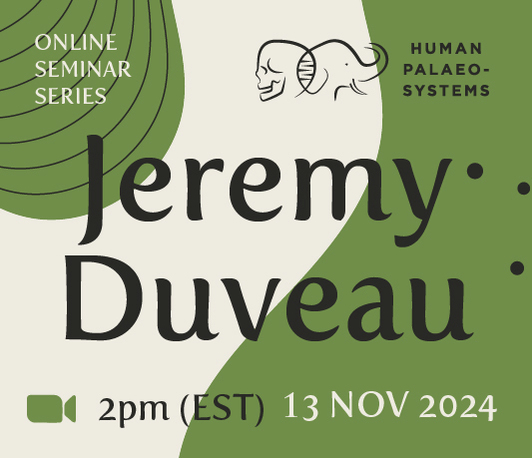Tracking the features of hominin groups from their footprints: biology, locomotion, behaviors
Human Palaeosystems in Focus Seminar Series
- Date: Nov 13, 2024
- Time: 02:00 PM - 03:00 PM (Local Time Germany)
- Speaker: Jeremy Duveau (University of Tubingen)
- Location: Online
- Host: Human Palaeosystems Research Group
- Contact: kutowsky@gea.mpg.de

Our knowledge of hominin evolution, whether biological, locomotor or behavioral, comes mainly from fossilized skeletal remains or archaeological artifacts. However, this knowledge remains fragmentary. In this fragmentary context, one particular vestige is increasingly used: footprints. Footprints open a window onto brief moments in life, a unique time scale that is inaccessible from skeletal remains or archaeological artefacts. Through this particular temporal scale, footprints provide original information about the groups who left them, and offer another point of view for understanding human evolution. However, the study of footprints is complex. On the one hand, they are relatively rare in the fossil record, especially when compared with the more abundant skeletal remains. On the other hand, their morphology results not only from the body and biomechanical characteristics of the individuals, but also from the nature of the substrate (e.g. granulometry or humidity) as well as from taphonomic agents. Using several examples from the fossil record, this presentation will focus on the development of experimental methods used to study footprints. It will also demonstrate the diversity of information, but also its limitations, that can be obtained from this unique material, offering a unique perspective on human evolution.
About the Speaker

Jérémy Duveau is a paleoanthropologist born in Tours, France. He completed a Bachelor's degree in Geology and a Master's degree in Paleontology at the University of Poitiers (France), and a second Master's degree in Prehistory at the Muséum National d'Histoire Naturelle in Paris. He earned a PhD in February 2020 from the Muséum national d'Histoire naturelle in Paris after defending his thesis on the Neandertal footprints from Le Rozel (Normandy, France). Since 2022, he has been a postdoctoral researcher at the University of Tübingen, where his research has been funded by the FYSSEN foundation between 2022 and 2023.
His research focuses on the biological and locomotor characteristics of hominins. It is based on the study of footprints and skeletal remains using a multidisciplinary approach including anatomy, statistics and imaging techniques. Collaborating on different international projects, he is involved in the study of sites in France, Spain and Morocco.
